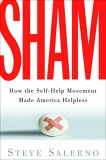Summary | Excerpt | Reviews | Beyond the Book | Readalikes | Genres & Themes | Author Bio

Critics' Opinion:
Readers' Opinion:
First Published:
Jun 2005, 288 pages
Paperback:
Sep 2006, 288 pages
 Book Reviewed by:
Book Reviewed by:
BookBrowse Review Team
Buy This Book
Remember–this is only what we can document. And it does not include the
broader social and political costs, which we'll discuss separately.
Between thirty-five hundred and four thousand new self-help books
appeared in 2003, depending on whose figures you use and precisely how
you define the genre. The higher figure represents more than double the
number of new SHAM titles that debuted in 1998, when wide-eyed social
commentators were remarking at self-help mania and what it signified
about the decline of premillennial Western civilization. Together with
evergreens like Codependent No More, Melody Beattie's seminal
1987 tract on overcoming self-destructive behaviors, these books
accounted for about $650 million in sales, according to Simba
Information, which tracks publishing trends.
Self-help was well represented on best-seller lists in 2004, anchored by
a spate of musings from the Family McGraw (Dr. Phil and son Jay); Rick
Warren's The Purpose Driven Life; Joel Osteen's spiritually
tinged Your Best Life Now: 7 Steps to Living at Your Full Potential;
Greg Behrendt's cold shower for lovelorn women, He's Just Not That
into You; and actualization demigod Stephen R. Covey's The 8th
Habit: From Effectiveness to Greatness. The last is a sequel to
Covey's blockbuster work, The 7 Habits of Highly Effective People,
which remains a postmodern classic, as do Tony Robbins's various tomes
about that giant who slumbers within you and the six dozen separate
Chicken Soup books now in print. Stephen Covey, too, has a son,
Sean, and Sean Covey has his very own best seller, The 7 Habits of
Highly Effective Teens. Freshly minted guru-authors appear like
clockwork each year.
They almost have to, if the demand is to be met. In fact, by 1983, so
substantial were sales figures for books of this genre that the lofty
New York Times Book Review, which for decades fought the good fight
on behalf of books written by actual writers, threw in the towel and
added another category, "Advice Books," to its distinguished best-seller
list. In an accompanying announcement, Times editors explained that
without this new category even the most compelling works of authentic
nonfiction–memoirs, exposés, biographies, think pieces, and the
like–might never appear on their own best-seller list. They were being
swept aside by this massive wave of self-improvement. Ten years later, a
study quoted in American Health magazine said that self-help
addicts–and addict, evidence suggests, is the right word–continue to buy books
"long after their shelves are stocked." Publishers Weekly
put it this way in October 2004: "Self-help books are a Teflon category
for many booksellers. No matter the economy or current events, the demand is
constant."
Another cultural signpost: A fair percentage of these book-buying
transactions take place at the five thousand New Age bookstores now
spread throughout the United States. (Industry sources thought the New
Age trend had peaked a few years ago, when the number of stores hit four
thousand.) Thus it should come as no surprise that the fastest-growing
self-help sectors are also the softest and least utilitarian. Sales of
inspirational, spiritual, and relationship-oriented programs and
materials constitute a third of overall SHAM dollar volume and are
tracking upward. The more brass-tacks stuff–business and financial
materials, tactical training–constitute 21 percent and are tracking
down. Americans seem to think it's more important to get along than to
get ahead.
Excerpted from Sham by Steve Salerno Copyright © 2005 by Steve Salerno. Excerpted by permission of Crown, a division of Random House, Inc. All rights reserved. No part of this excerpt may be reproduced or reprinted without permission in writing from the publisher.





The House on Biscayne Bay
by Chanel Cleeton
As death stalks a gothic mansion in Miami, the lives of two women intertwine as the past and present collide.

The Flower Sisters
by Michelle Collins Anderson
From the new Fannie Flagg of the Ozarks, a richly-woven story of family, forgiveness, and reinvention.

The Funeral Cryer by Wenyan Lu
Debut novelist Wenyan Lu brings us this witty yet profound story about one woman's midlife reawakening in contemporary rural China.
Your guide toexceptional books
BookBrowse seeks out and recommends the best in contemporary fiction and nonfiction—books that not only engage and entertain but also deepen our understanding of ourselves and the world around us.